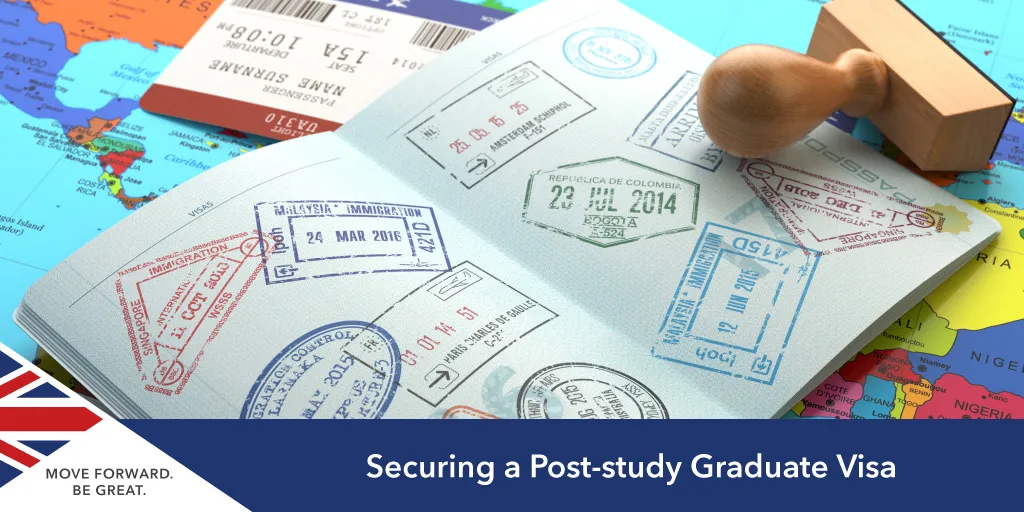A Post-Study Work visa, officially known as the Graduate visa, gives you permission to stay in the UK for at least two years after you successfully complete a course in the UK. The Graduate visa is a great option for international students in the UK as they do not need a sponsor or job offer to obtain this visa.
Additionally, after obtaining it, you’re free to switch careers and jobs, so you have a little time to figure out what you want to do in the UK and your post-study lives. Let’s get into more detail about the Graduate visa route below.
What’s the Graduate visa route in the UK?
International students in the UK have many visa options following graduation which allow them to stay in the UK. From these, the Graduate visa route is one of the most commonly accessed paths as it’s an unsponsored visa route that allows you the chance to look for employment opportunities for up to two or three years after completing your course in the UK.
Students of any skill level and any degree level are eligible to apply for the Graduate visa to extend their stay in the UK. However, the validity of your PSW depends on your degree level.
Graduate visa: Updates from the UK government
The Graduate visa was introduced relatively recently by the UK government – in July 2021. Since it’s a new type of visa, it’s good to have an idea on the latest updates from the UK government so you’re clear on the details before you start your application. Here’s an overview of the timeline:
- 2012 – The UK removes the Tier 1 Post Study Work visa
- July 2021 – The UK introduces the Graduate visa route
- Early 2024 – The UK government conducts a rapid review of the Graduate visa route and its implementation
- Late 2024 – The UK government announces that the Graduate visa route will remain ‘in place’ for the time being
Since its introduction, the Graduate visa route has been a popular one among international students, especially Indian nationals. Take a look below to see the key statistics of the PSW visa in the UK in 2023.
Graduate visa: Key statistics
When considering studies abroad, one of the factors you should consider is how you can find work in the country you’re studying in after completing your course, if this is a part of your plan. Many foreign countries have specific immigration laws for international students looking for work after their higher studies. The Graduate visa route is a popular one chosen by many Indian nationals in the UK, as shown below:
| Category | Details |
|---|---|
| Graduate Visas Issued in 2023 | 114,409 main applicants | 29,475 dependents |
| Top Five Nationalities Granted Graduate Visas | India, Nigeria, China, Pakistan, US |
| Average Annual Earnings of Indian Graduate Visa Holders (2023) | £25,465 |
PSW visa in UK: Validity
The Graduate visa is only valid for two years for bachelor’s or master’s students and three years for PhD or doctoral students. You’re not allowed to extend the PSW visa under any circumstances beyond this time period and you’ll have to consider other visa categories afterwards if you wish to stay in the UK. Your PSW in UK will start from the day your application is approved by the Home Office. Now let’s look at how to determine if you’re eligible for a Graduate visa.
Eligibility
The Graduate visa allows you to stay in the UK without needing an employer to sponsor your visa. This means that many international students are eligible to apply for it. You can apply for a PSW visa in UK if you meet the following criteria:
- You’re in the UK at the time of your application
- Your current visa is a Student visa
- You studied a UK bachelor’s degree, postgraduate degree, or other eligible course for a minimum period with your Student visa
- Your education provider (such as your university or college) has told the Home Office you’ve completed your course.
Which courses are eligible?
If you’ve studied one of the following courses in the UK on a Student visa, you’re eligible to apply for a PSW in UK:
- Bachelor’s degree
- Master’s degree
- PhD or doctorate
- Law conversion course approved by the Solicitors Regulation Authority
- Legal Practice Course in England and Wales, the Solicitors Course in Northern Ireland, or a Diploma in Professional Legal Practice in Scotland
- Bar Practice Course in England and Wales or the Bar Course in Northern Ireland
- Foundation programme in medicine or dentistry
- Postgraduate Certificate in Education (PGCE)
- Postgraduate Diploma in Education (PGDE)
You’ll also likely be able to apply if your course makes you eligible for a job that’s regulated under the UK law or a UK public authority – if you’re unsure, it’s best to check with your education provider on this and the eligibility of your course.
You need to have studied in the UK for either:
- At least 12 months, if your course’s total length is more than 12 months
- The total length of your course, if its total length is shorter than 12 months
Your education provider (such as your university or college) must inform the Home Office you’ve successfully completed your course.
What if you switched courses?
Let’s say you switched your degree programme after coming to the UK – that doesn’t affect your Graduate visa application as long as you did so without applying for a new Student visa. In short, if your university allowed you to switch your programme without applying for a new study visa, this won’t affect your Graduate visa application, as long as you’ve completed the new course you switched to.
How long you can stay
Your PSW visa will last for:
- Two years if you’re a bachelor’s or master’s student
- Three years if you’re a doctoral student
Your visa will be valid from the day your application is approved by the UK’s Home Office.
When to apply
Once you’ve received your final results and your university record has been updated to reflect the completion of your studies, your university will typically send you an email confirming that they’ve reported back to the UK’s Home Office on your status. That’s when you can apply for your PSW visa in UK.
You’ll need to apply for your Graduate visa while your study visa is still valid and you can’t travel overseas until you’ve received the outcome of your application. If your Student visa expires during this time period, you can stay in the UK until you’ve received the final decision of your new visa.
Processing time for a UK Graduate visa
You’ll likely get a decision on your Graduate visa within eight weeks of your application. Your application will take longer if your supporting documents need to be verified or you have to explain your personal circumstances.
Application process for a UK Graduate visa
Similar to when you applied for your Student visa, when you apply for a PSW visa in UK you’ll have to submit an online application via Gov.uk, and your partner or any other dependents will have to apply separately. However, before you begin your application, it’s important that you gather all your supporting documents correctly so that you can submit a successful Graduate visa application.
Documents required
The documents you submit with your Graduate visa application will determine whether you’re successful. You’ll be required to provide:
- A valid passport
- Your Biometric Residence Permit (BRP) if you received one with your Student visa
- Your Confirmation of Acceptance for Studies (CAS) reference number from when you applied for your Student visa (This would’ve been given to you by your education provider). If you’ve misplaced your CAS number, you can always ask your education provider for it as they’ll have a record.
- Proof of your relationship with your partner or children (if applicable)
- A letter from your scholarship or sponsorship provider if they’ve paid towards your course fees and living expenses in the 12 months prior to your application
Can my dependents apply?
If your partner or children joined you in the UK as dependents on your Student visa, they can apply as dependents for your Graduate visa. If your child was born in the UK while you were on a Student visa, they can apply as a dependent for your Graduate visa.
PSW visa in UK: Fees
You’ll need to pay the £822 application fee and the healthcare surcharge which varies depending on the number of years you’re getting the visa for. If you’re eligible for a Graduate visa for:
- Two years, it will cost £2,070
- Three years, it will cost £3,105
If you work in the public healthcare sector
You may be able to get a refund on your healthcare surcharge if you get a job in the public healthcare sector. This depends on a number of factors about your circumstances.
What you can and cannot do
Graduate visa holders can engage in a number of different activities in the UK. Most international students who get a Graduate visa use the opportunity to explore job opportunities, build key skills for their respective fields in an international environment, and make important industry connections.
These experiences and connections are especially important if you wish to stay in the UK after your Graduate visa’s validity period expires – in order to find a sponsor for your Skilled Worker visa or to gain the necessary qualifications for another type of visa. Here’s an overview of what you can and can’t do with your visa:
| What You Can Do | What You Cannot Do |
|---|---|
| Paid employment | Apply for most public benefits or the State pension |
| Unpaid employment | Work as a professional sportsperson |
| Look for work | Studying most education courses |
| Be self-employed | |
| Continue living in the UK with your partner and children if they’re eligible | |
| Do voluntary work | |
| Travel abroad and return to the UK |
Studying with a graduate visa
You can only study on a Graduate visa if your chosen course isn’t eligible for a Student visa. If you wish to undertake further studies in the UK, like doing a master’s after your bachelor’s, you can just extend your Student visa.
Graduate visa: Key benefits for Indian students
The UK is a top choice for Indian students seeking higher education abroad, and with the introduction of the Graduate visa, it has become an even more lucrative option as it allows an unsponsored visa route after studies. Indian students made up nearly 50% of the total Graduate visas granted in the year ending March 2024. The key benefits of the Graduate visa route for Indian students include:
-
Two-year post-study work permit – Since the Graduate visa allows Indian students to stay in the UK for either two or three years after their studies, they can use that opportunity to gain valuable skills and experience in their respective careers. The UK provides multicultural work environments and is home to top companies, so Indian nationals can craft their professional networks.
-
No sponsor required – One of the biggest advantages of the Graduate visa route is that it requires no work sponsorship. This means that Indian students can graduate without stressing about finding an employer to sponsor their PSW in UK.
-
Three-year PSW rights for PhD students – The Graduate visa provides a unique opportunity for PhD students, as they can stay in the UK for three years after the completion of their PhD programme. This means that you’ll be able to benefit from the lucrative job market for PhD-holders in the UK, especially in higher education, healthcare, and engineering sectors.
-
Work rights for dependents – The Graduate visa is open for your partner or children who’ve come to the UK with you as dependents on your Student visa. They can submit separate applications as dependents and if successful, they’ll enjoy rights to work in the UK.
-
Ability to work in any sector – The Graduate visa doesn’t restrict you to a particular job or field. You can use your time in UK to explore different jobs and opportunities so you can shape your future the way you wish to.
If you want to stay longer in the UK
If you wish to stay in the UK after your Graduate visa expires, you’ll have to apply for a Skilled Work visa or another relevant visa. We’ve used the next few sections to highlight three popular visa routes in the UK.
What’s the Skilled Worker route?
The Skilled Worker route requires you to have a qualifying job offer from a Skilled Worker sponsor. You must meet the following requirements to apply for this visa:
- Have a confirmed job offer from a UK employer who has been approved by the Home Office
- Have a Certificate of Sponsorship (CoS) from your employer
- Do a job that’s on the list of eligible occupations
- Be paid a minimum salary which depends on the type of work you do and the date you got your CoS
- Meet the English language requirement. One way of meeting this requirement is by getting a degree from a UK institution
This is a great option for those who wish to remain in the UK for longer. According to the Home Office’s 2023 statistics, the five most common sectors where a CoS was used to apply for a visa were:
- Human health and social work activities
- Information and Communications
- Professional, scientific, and technical activities
- Financial and insurance activities
- Manufacturing
The cost of your application depends on the type of job offer you have. We’ve covered this in detail below.
Skilled Worker route: Cost
When applying for your Skilled Worker visa, you’ll have to plan for these costs:
- Your application fee will range from £719 to £1,639 depending on your circumstances
- The healthcare surcharge which is typically about £1,035 per year
You’ll also have to show that you have enough money to support yourself for at least a month after you arrive in the UK, which is about £1,270.
Skilled Worker route: Immigration salary list
When applying for the Skilled Worker visa, it’s important to have a clear understanding of the immigration salary list, which replaced the UK’s previous Shortage Occupation List. You can use the immigration salary list to find jobs in various areas in the UK and check their minimum salary rates. With this information, you can narrow down the jobs you’re applying for to find a sponsorship that aligns with the minimum salary rate stipulated by the Home Office’s regulations.
Innovator Founder visa
If you want to set up and run an innovative business in the UK, you can apply for an Innovator Founder visa. You must be able to show that your business idea is new, viable, scalable, and innovative. You’ll also need to get an endorsing body to assess that your idea meets the requirements. You can either apply for this visa from outside the UK or switch to it from another type of visa while in the UK.
Get advice on staying in the UK after graduation
Planning your career and life after your higher studies in the UK is an important step for any international student. One of the most important components of this planning process is to ensure that you’re knowledgeable about your visa options in the UK after graduation.
If you’re planning on studying in the UK or are currently in the UK and planning on applying for a Graduate visa, we’re ready to support you. We’ll be able to help you in understanding the UK's immigration laws, post-study career options in the UK, and how to submit your Graduate visa application correctly. Contact us today.
FAQs
Who is eligible for PSW in the UK?
The Graduate visa is the most common PSW in UK, available to bachelor’s, master’s, or doctoral students who’ve successfully completed a course in the UK. It allows students to further their stay in the UK for two or three years without a sponsor.
How long is UK PSW valid for?
The period of validity of the UK PSW or the Graduate visa depends on the level of study you undertook on your Student visa. If you are a bachelor's or master’s student, you’ll be able to obtain a Graduate visa for two years. A PhD or doctorate student can stay up to three years on their Graduate visa.
What is the benefit of PSW in UK?
There are many benefits to obtaining a PSW visa in UK. If you get the Graduate visa, you don’t need a sponsor, you can stay in the UK for two or three years to explore career opportunities, and you can work in almost any field.
How much is PSW in the UK after Master’s?
You’ll need to pay the £822 application fee and the healthcare surcharge which varies depending on the number of your years you’re getting the visa for. As a master’s student, you’ll be eligible for a Graduate visa for two years, which will cost £2,070.





 I sincerely thank SI-UK for getting me accepted to UCL. The MSc in Urban Development and Planning is extremely competitive, but the right guidance provided by SI-UK made my dream of studying at University College London a reality. The services were exceptional from beginning to end.
I sincerely thank SI-UK for getting me accepted to UCL. The MSc in Urban Development and Planning is extremely competitive, but the right guidance provided by SI-UK made my dream of studying at University College London a reality. The services were exceptional from beginning to end. 

